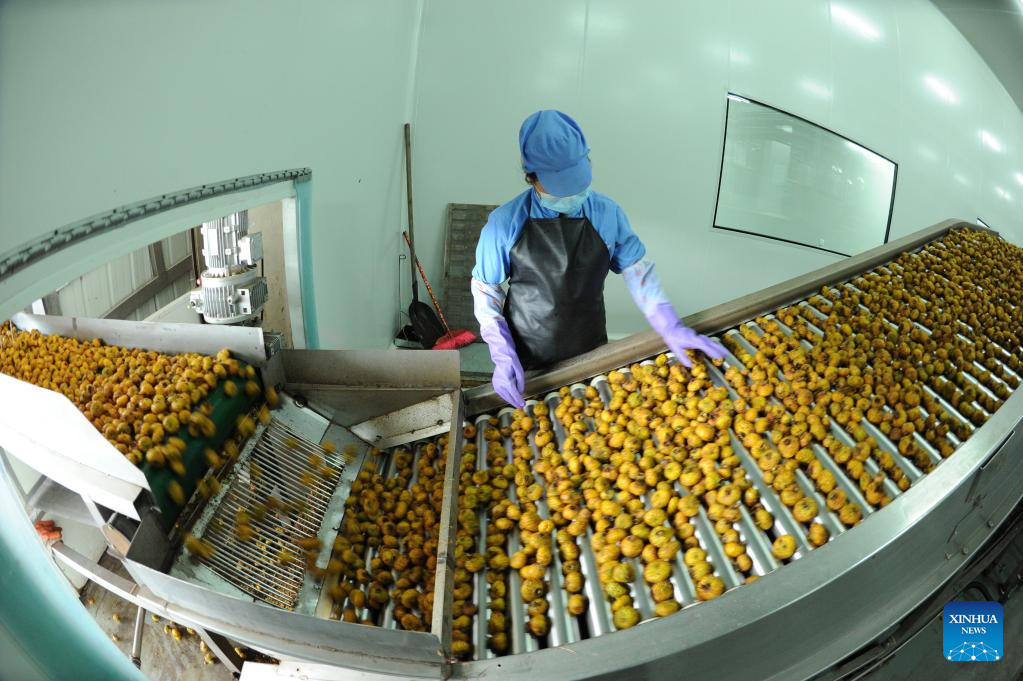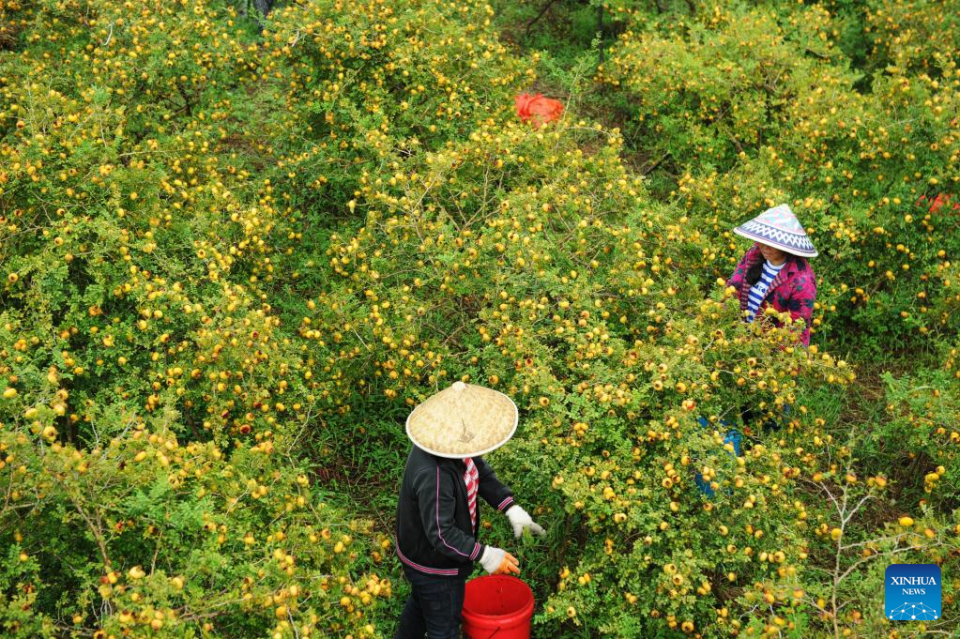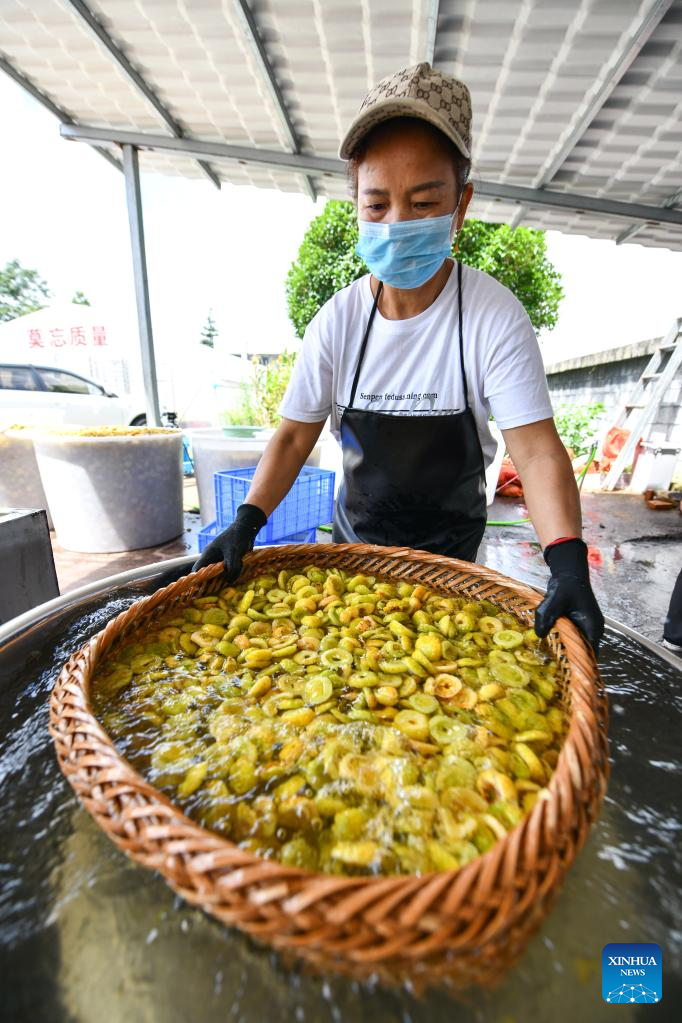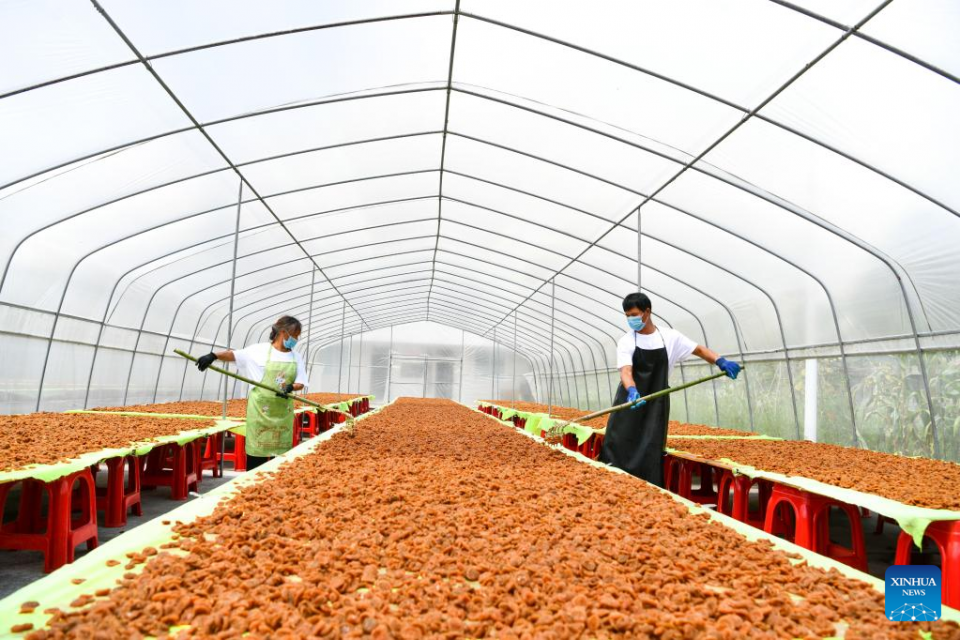
A worker sorts thorn pears at a fruit processing enterprise in Longli County, southwest China's Guizhou Province, Aug. 23, 2018.(Xinhua/Yang Wenbin)
GUIYANG, June 20-- The thorn pear, as its name suggests, is a wild fruit species that is adorned with thorns in its natural state. However, when juiced, it reveals a blend of sourness and subtle sweetness.
This plant, which has the Latin name Rosa roxburghii, has long been a hidden gem. Thriving in the mountainous province of Guizhou in southwest China, the fruits were largely dismissed as nourishment for the wildlife and juggling balls for the cowherds.
"The thorn pears 'live' in rocky nooks, nestled amidst thistles and thorny shrubs," said Ren Guangwei, a 51-year-old resident of Jiaxi Village. "In the past, the fruit was rarely consumed, let alone cultivated."
Now, this unassuming wild fruit has become a catalyst for prosperity among local farmers. More than 2.1 million mu (about 140,000 hectares) of land are given over to thorn pear cultivation in Guizhou, making it the leading region in the country. The overall output value has surged from nearly 3.69 billion yuan (about 500 million U.S. dollars) in 2019 to 15 billion yuan last year.
The local proverb, "when thorn pears are in the market, the imperial physician can take it easy," speaks volumes about the medical value of this wild fruit.
According to the Dictionary of Chinese Medicine, the flowers, fruits, leaves and seeds of thorn pears possess medicinal properties, particularly beneficial for digestive health. The root bark, meanwhile, is known for its anti-diarrheal effects.
Also, scientific research has revealed that the vitamin C content per 100 grams of thorn pear fruit ranges from 1,980 mg to 3,750 mg, surpassing that of many other fruits and vegetables.
Yang Yongjun, vice president of a Guizhou-based thorn pear processing enterprise, aptly describes the thorn pear as a "fruit nutrition bank," drawing from studies and research, especially that conducted by companies.
"The growing of thorn pears has very special requirements regarding temperature and environmental conditions," Yang said, adding that Guizhou boasts a remarkable combination of factors and is one of the world's finest producing regions for thorn pears. The karst landform found around the 25 degrees north latitude offers unparalleled climatic conditions, fostering the cultivation of high-quality thorn pears.
Now, Guizhou is home to 78 production and processing enterprises centered on thorn pear products, with a collective processing capacity of about 320,000 tonnes of fresh fruit annually.
Ren's decision to transfer 22 mu of his land to a thorn pear company has proven to be fruitful. With an annual rent of 400 yuan per mu, he has not only secured a stable income but has also found employment at a thorn pear base, earning an additional 100 yuan per day.
Reflecting on the past, Ren said the vast potential of thorn pear cultivation and its nutritional and economic value were previously unknown to him. "However, the flourishing industry has enabled my family of five to live a more prosperous and fulfilling life," Ren said.

Farmers pick thorn pears in Gujiao Town of Longli County, southwest China's Guizhou Province, Aug. 22, 2018.(Xinhua/Yang Wenbin)

A farmer picks thorn pears in Gujiao Town of Longli County, southwest China's Guizhou Province, Aug. 22, 2018.(Xinhua/Yang Wenbin)

A farmer washes thorn pears at a cooperative in Gujiao Town of Longli County, southwest China's Guizhou Province, Aug. 18, 2021.(Xinhua/Yang Wenbin)

Farmers dry thorn pears at a cooperative in Gujiao Town of Longli County, southwest China's Guizhou Province, Aug. 18, 2021.(Xinhua/Yang Wenbin)

A farmer picks thorn pears in Gujiao Town of Longli County, southwest China's Guizhou Province, Aug. 18, 2021.










